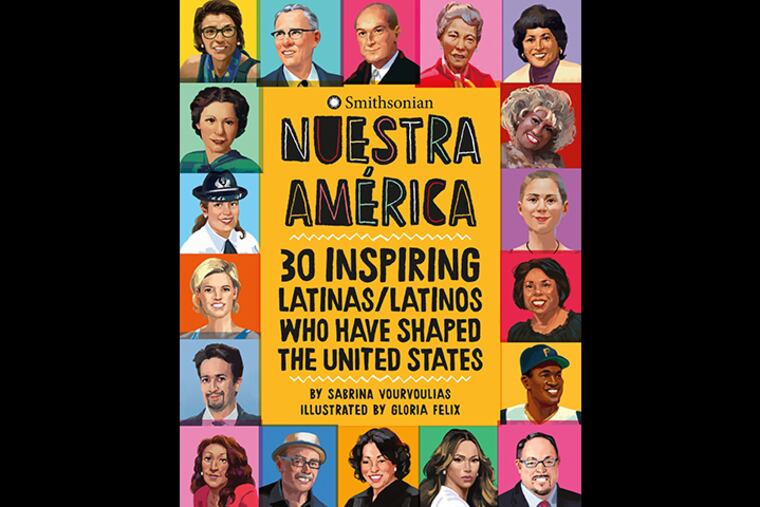Trump’s ‘patriotic education’ keeps us from learning our greatest — and hardest — lessons | Helen Ubiñas
Books like the recent “Nuestra América: 30 Inspiring Latinas/Latinos Who Have Shaped the United States” note that people's contributions are often made against all odds.

I was flipping through a new book about notable Latinos when my thoughts turned to Donald Trump and his recent push to further whitewash American history with “patriotic education.”
Nuestra América: 30 Inspiring Latinas/Latinos Who Have Shaped the United States is an anthology from the Smithsonian Latino Center. It is written by Philadelphia-area writer Sabrina Vourvoulias and illustrated by Gloria Félix, a Los Angeles-based artist. It’s a vibrant book that has a lot to offer both young readers and adults. (Add it to your list.)
Included are stories about pioneers Luis Walter Alvárez, a physicist, and Supreme Court Justice Sonia Sotomayor; artists Celia Cruz (the Queen of salsa and my all-time favorite) and Lin-Manuel Miranda, of Hamilton fame. Also, activists César Chávez, Sylvia Rivera and Emma González, who became an advocate for gun control after surviving the 2018 Stoneman Douglas High School shooting in Parkland, Fla.
Above all these are celebratory stories about their contributions to the cultural, social, and political character of the United States. But although they don’t dwell on the challenges they met in pursuit of their goals, they do note that the contributions were often made against all odds, and weren’t always appreciated.
“One of the things that’s remarkable about so many of these people is the tenacity and the will to accomplish what they did despite everything that made them outsiders in their own country,” said Vourvoulias.
After returning to the United States, decorated WWII Staff Sgt. Marcario García was denied service in a Texas restaurant because he was Latino.
In 1988, Dolores Huerta was brutally beaten by San Francisco police while protesting the use of pesticides in growing table grapes.
Because of their calls for more gun control, González and her classmates have been subjected to personal attacks and death threats. And yet, she contends in the book:
“We are going to be the kids you read about in textbooks.”
I lingered on that quote, inspired anew by the courage of our young people. But I also worried about what would happen to these stories and others like them in a patriotic curriculum that above all chooses to ignore U.S. history’s hard truths.
Trump signed an executive order in September to create a “1776 commission” to replace the “web of lies in our schools and classrooms” and replace them with the “magnificent truth” about the U.S., which he called the “most fair, equal, and prosperous nation in human history.”
History would like a word, Mr. President. …
So would some of the people profiled in the book, I’m sure.
I was well into my 20s when I first learned about “the other Brown,” a school desegregation case that preceded Brown vs. Board of Education by eight years.
Yep, eight.
Mendez vs. Westminster challenged the California laws that forced Mexican children to attend substandard, segregated schools. It also helped lay the groundwork for Brown.
Who knew? Nowhere in my history books or lessons was the 1946 case ever mentioned.
I convinced the newspaper I was working for at the time to send me to California — this was back when regional papers had healthy travel budgets — to bring back the story about the family behind the landmark legislation, including Sylvia Mendez.
Mendez, who in 2011 won the Presidential Medal of Freedom, is one of 30 people profiled in the book.
How wonderful, I remember thinking after meeting her, would it have been for her family’s story to be widely shared in history books. What a lasting impression it would have made to students who looked like me to know that long before we were born a Mexican father and a Puerto Rican mother fought discrimination in the name of their children and the children who would come after.
That we benefited from their struggle and should continue their fight for equality.
That’s just a part of what Trump’s playbook of propaganda misses, as his administration bans teaching critical race theory and anti-racism training.
How much greater could America be if we didn’t erase our past, how much richer our connections to one another if we acknowledged and celebrated the contributions of immigrants and all the “others” that Trump and his administration aren’t just trying to cut out of our history books but also our country.
How less likely we’d be to repeat America’s worst history if we didn’t turn away from its greatest lessons.